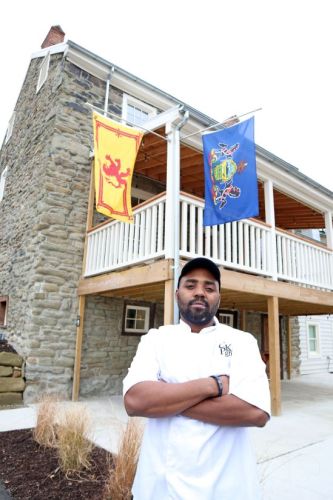Last March 16, when the restaurant industry came to a halt due to Covid, Jennifer Flanagan got moving.
The executive director of Community Kitchen Pittsburgh (CKP), a nonprofit culinary training center located at 107 Flowers Ave. in Hazelwood, mobilized her team to help people in need.
Since that day, with funding from the Coronavirus Aid, Relief, and Economic Security (CARES) Act and individual donors, the organization has dished out more than 400,000 meals for charities, schools and elderly care centers and has teamed up with local businesses to ride out the storm.

CKP, which launched in 2013 as part of a national system of learning facilities called Catalyst Kitchens, trains adults who have experienced barriers to employment, such as incarceration, homelessness, addiction or trauma. Wraparound services, including case management, life skills classes and referrals, come at no cost to the student.
The only prerequisite? “It’s the desire to get back into the workforce,” Flanagan says. “We can work around a lot of other barriers, help you get your GED; we can help you through hard times. It’s about getting people employed at the end.”
The organization has placed 35 people in food service jobs since the pandemic began.
With eateries still operating at limited capacity, most of the positions have been in grocery stores, bakeries, prepared food businesses and other segments of the industry that weren’t as decimated by Covid as dining establishments.
The school did, however, team up with its new Hazelwood neighbor, The Woods House Historic Pub at 4604 Monongahela St., which opened in December 2020. There, transitional employees get a crash course in restaurant service.

After operating under a hybrid online/in-person model since July, CKP finally has pupils back in the classroom four days a week. During the 12-week program, they learn everything from basic knife skills and recipes for mother sauces to high-volume cooking and sanitation practices.
Students also lend a hand in contract packaging, or co-packing: using the commercial kitchen as a spot to help area food producers, farms and other businesses make and distribute their goods to the masses. Current co-packing partners include The Greek Gourmet Marketplace and Scratch & Co.
During the Lenten season, they’ll spend each Friday from 11 a.m. to 7 p.m. doling out fish sandwiches and platters. On Feb. 19, they sold 240 pieces of fish, 60 dozen pierogies and heaping helpings of macaroni and cheese, fries, halušky and coleslaw.
While the fish fry is a longstanding CKP event, the center is now creating its own product lines and revenue streams.
“We are trying to set ourselves up for the future,” says Tony Cortese, CKP’s director of social enterprise. “There are lots of questions out there on what the food service industry is going to be like.”
CKP now has its own brand of coffee. Second Avenue Blend, roasted by Nicholas Coffee & Tea Co., is available in CKP’s online store in mild, bold and espresso blends. They’re hoping to open a café featuring cups of joe, as well as breakfast and lunch options.
Other projects on the horizon include a CKP ice cream and a six-month residency in a local restaurant. Flanagan and Cortese are talking to local chefs, many of whom volunteer as guest instructors at the facility, to make these dreams a reality. On the flip side, CKP invites other pop-up restaurateurs who don’t have a brick-and-mortar spot to use its kitchen space.
“The more we get Community Kitchen Pittsburgh’s name out there, the more it’s going to validate the things that we do,” Cortese says.

